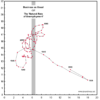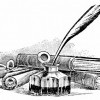The Capital as Power working paper series showcases cutting edge research on the political economy of capitalist power. The series is open to a wide-range of issues: theoretical, empirical, historical or contemporary. The aim is to stimulate debate and discussion on the capital as power framework. If you are interested in submitting a working paper, please email us and put “Working Papers” in the subject line.

March 15, 2021
ABSTRACT We write this essay for both lay readers and scientists, though mainstream economists are welcome to enjoy it too. Our subject is the basic toolbox of mainstream economics. The most important tools in this box are demand, supply and equilibrium. All mainstream economists – as well as many heterodox ones – use these tools, … Read more

2021/02: Fix, ‘Living the good life in a non-growth world: Investigating the role of hierarchy’
February 10, 2021
ABSTRACT Humanity’s most pressing need is to learn how to live within our planet’s boundaries — something that likely means doing without economic growth. How, then, can we create a non-growth society that is both just and equitable? I attempt to address this question by looking at an aspect of sustainability (and equity) that is … Read more

February 10, 2021
ABSTRACT FROM THE ARTICLE: According to the capital as power framework, pecuniary earnings, or profits, are a symbolic representation of the struggle for power between different capitalist groups. In this struggle, capitalists measure their own power differentially – that is, relative to other capitalist entities. The focus on differential power, expressed in differential earnings, leads … Read more

2020/06: Bichler & Nitzan, ‘The Limits of Capitalized Power. A 2020 U.S. Update’
December 23, 2020
ABSTRACT Until the late 2000s, our work focused primarily on why capitalism should be understood as a mode of power. We argued that capital itself is a form of organized power and researched how capitalists sustain, defend and augment their capitalized power. We called our approach ‘capital as power’ – or CasP, for short. But … Read more

2020/05: Fix, ‘Can the World Get Along Without Natural Resources?’
July 12, 2020
ABSTRACT Neoclassical economists fundamentally misunderstand the role of natural resources in the economy. I discuss here the source of this misunderstanding, and the ways we can better understand the role of energy to human societies. Download PDF | bnarchives

2020/04: McMahon, ‘Reconsidering Systemic Fear and the Stock Market: A Reply to Baines and Hager’
July 1, 2020
ABSTRACT A recent New Political Economy article by Baines and Hager (2020) critiqued Shimshon Bichler and Jonathan Nitzan’s capital-as-power (CasP) model of the stock market (Bichler & Nitzan, 2016). Bichler and Nitzan’s model of the stock market seeks to explain how financial crises are tied to the (upper) limits of redistributing income through power. Bichler … Read more

2020/03: Bichler and Nitzan, ‘Manuscripts Don’t Burn’
June 2, 2020
ABSTRACT The French Revolution changed the world. In the new order, the masters no longer need Monsieur Fouche and the thought police. They don’t need guillotines to clip brains and scissors to censor pamphlets. They don’t need strategic-studies institutes to manage oppression and navigate conflict. Instead, they prefer to subsidize ‘cultural pluralism’ and ‘critical studies’, … Read more

June 2, 2020
ABSTRACT This interview was commissioned in October 2019 for a special issue on ‘Accumulation and Politics: Approaches and Concepts’ to be published by the Revue de la régulation. We submitted the text in March 2020, only to learn two months later that it won’t be published. The problem, we were informed, wasn’t the content, which … Read more

Nessun commento:
Posta un commento